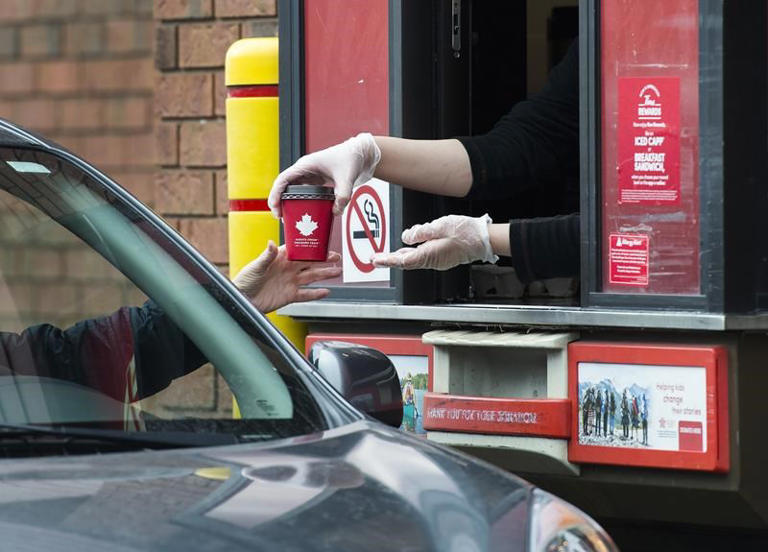Alberta
Tim Hortons app violated privacy laws in collection of ‘vast amounts’ of sensitive location data

People who downloaded the Tim Hortons app had their movements tracked and recorded every few minutes of every day, even when their app was not open, in violation of Canadian privacy laws, a joint investigation by federal and provincial privacy authorities has found.
The investigation concluded that Tim Hortons’ continual and vast collection of location information was not proportional to the benefits Tim Hortons may have hoped to gain from better targeted promotion of its coffee and other products.
The Office of the Privacy Commissioner of Canada, Commission d’accès à l’information du Québec, Office of the Information and Privacy Commissioner for British Columbia, and Office of the Information and Privacy Commissioner of Alberta issued their Report of Findings today.
The Tim Hortons app asked for permission to access the mobile device’s geolocation functions, but misled many users to believe information would only be accessed when the app was in use. In reality, the app tracked users as long as the device was on, continually collecting their location data.
The app also used location data to infer where users lived, where they worked, and whether they were travelling. It generated an “event” every time users entered or left a Tim Hortons competitor, a major sports venue, or their home or workplace.
The investigation uncovered that Tim Hortons continued to collect vast amounts of location data for a year after shelving plans to use it for targeted advertising, even though it had no legitimate need to do so.
The company says it only used aggregated location data in a limited way, to analyze user trends – for example, whether users switched to other coffee chains, and how users’ movements changed as the pandemic took hold.
While Tim Hortons stopped continually tracking users’ location in 2020, after the investigation was launched, that decision did not eliminate the risk of surveillance. The investigation found that Tim Hortons’ contract with an American third-party location services supplier contained language so vague and permissive that it would have allowed the company to sell “de-identified” location data for its own purposes.
There is a real risk that de-identified geolocation data could be re-identified. A research report by the Office of the Privacy Commissioner of Canada underscored how easily people can be identified by their movements.
Location data is highly sensitive because it can be used to infer where people live and work, reveal trips to medical clinics. It can be used to make deductions about religious beliefs, sexual preferences, social political affiliations and more.
Organizations must implement robust contractual safeguards to limit service providers’ use and disclosure of their app users’ information, including in de-identified form. Failure to do so could put those users at risk of having their data used by data aggregators in ways they never envisioned, including for detailed profiling.
The investigation also revealed that Tim Hortons lacked a robust privacy management program for the app, which would have allowed the company to identify and address many of the privacy contraventions the investigation found.
The four privacy authorities recommended that Tim Hortons:
- Delete any remaining location data and direct third-party service providers to do the same;
- Establish and maintain a privacy management program that: includes privacy impact assessments for the app and any other apps it launches; creates a process to ensure information collection is necessary and proportional to the privacy impacts identified; ensures that privacy communications are consistent with, and adequately explain app-related practices; and
- Report back with the details of measures it has taken to comply with the recommendations.
Tim Hortons agreed to implement the recommendations.
QUOTES
“Tim Hortons clearly crossed the line by amassing a huge amount of highly sensitive information about its customers. Following people’s movements every few minutes of every day was clearly an inappropriate form of surveillance. This case once again highlights the harms that can result from poorly designed technologies as well as the need for strong privacy laws to protect the rights of Canadians.”
“This report eloquently illustrates the risks inherent in the use of geolocation and the importance of transparent and accountable privacy practices. Without a suitable prior assessment, Tim Hortons collected sensitive information about its customers through its app, without their adequate knowledge or consent. It is to put an end to this kind of practice that Quebec has reviewed its legislation protecting personal information giving more powers to the Commission and making companies more accountable. ”
“This investigation sends a strong message to organizations that you can’t spy on your customers just because it fits in your marketing strategy. Not only is this kind of collection of information a violation of the law, it is a complete breach of customers’ trust. The good news in this case is that Tim Hortons has agreed to follow the recommendations we set out, and I hope other organizations can learn from the results of this investigation.”
“This investigation is yet another example where an organization has not effectively notified customers about its practices. Tim Hortons’ customers did not have adequate information to consent to the location tracking that was actually occurring. When people download and use these types of apps, it’s important that they know in advance what will happen to their personal information and that organizations follow through with their commitments.”
Alberta
Official statement from Premier Danielle Smith and Energy Minister Brian Jean on the start-up of the Trans Mountain Pipeline

Alberta
Protecting the right to vote for Canadian citizens: Minister McIver

Minister of Municipal Affairs Ric McIver issued the following statement in response to Calgary City Council’s vote to extend the right to vote to permanent residents:
“Yesterday, Calgary city council passed a motion advocating for permanent residents to be extended the right to vote in civic elections. Alberta’s government has been clear since the beginning: only Canadian citizens are able to vote in civic elections. That will not be changing.
“The Canadian Charter of Rights and Freedoms affirms the right of every Canadian citizen to vote and to run as a candidate. This right extends to voters in municipal, provincial and federal elections.
“Protecting our democracy is of the utmost importance. Our provincial election legislation, like the Local Authorities Elections Act, has also been clear since its inception that voting is a right of Canadian citizens.
“Alberta’s government is also ensuring that voting is accessible for more Albertans. The Municipal Affairs Statutes Amendment Act proposes to enable special ballot access for any voter who requests it, without having to provide any specific reason such as physical disability, absence from the municipality or working for the municipal election. The ministries of Seniors, Community and Social Services and Service Alberta and Red Tape Reduction are also making it easier for individuals to obtain the identification Albertans need for a variety of services, including the ability to cast a ballot.
“Our government will continue to protect the integrity of our elections and make sure voting is accessible for all Albertans who are Canadian citizens.”
-

 Uncategorized2 days ago
Uncategorized2 days agoMaking Alberta a geothermal energy leader
-

 Alberta2 days ago
Alberta2 days agoThree Calgary massage parlours linked to human trafficking investigation
-

 Alberta2 days ago
Alberta2 days agoAlberta’s vision for passenger rail
-

 Business1 day ago
Business1 day agoWEF panelist suggests COVID response accustomed people to the idea of CBDCs
-

 COVID-192 days ago
COVID-192 days agoStates move to oppose WHO’s ‘pandemic treaty,’ assert states’ rights
-

 Business2 days ago
Business2 days agoParliamentary Budget Officer forecasts bigger deficits for years to come
-

 Addictions2 days ago
Addictions2 days agoMust Watch: Addiction worker estimates 90% of “safer supply” drugs resold on black market
-

 conflict1 day ago
conflict1 day agoColumbia on Lockdown After pro-Palestinian Protesters Take Over Building, Hold Janitors Hostage






